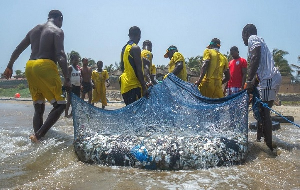The combination of illegal methods and distant-water fishing has inflicted significant economic and environmental damage on our oceans. According to a report by Welternährung (also known as Das Fachjournal der Welthungerhilfe), industrial fishing vessels unintentionally capture 38 million tonnes of sea creatures each year, only to discard them back into the water, dead or dying. This represents around 40% of the global fish catch and includes 300,000 small whales and dolphins, along with 250,000 endangered loggerhead turtles.
Beyond the direct harm to marine biodiversity, this also results in a substantial loss of economic opportunities. A new report by the Overseas Development Institute (ODI), a global affairs think tank, estimates the economic consequences for developing countries that allow such unsustainable and harmful practices in their waters.
The harmful practices include bycatch and incidental fishing, lack of transparency, underreporting catch tonnage, participation in the *Saiko* barter system, corruption, fishing without licenses, exceeding quotas, human rights abuses, and shark finning, among others. Although not all of these actions fall under the category of illegal, unreported, or unregulated (IUU) fishing, they are equally damaging to the environment and the economy.
In the ODI report, the human and economic costs of these activities are assessed in countries such as Ecuador, Peru, Senegal, Ghana, and the Philippines nations which are particularly vulnerable to the effects of overfishing. These nations' waters host a significant presence of foreign distant-water fishing (DWF) fleets, making them susceptible to unsustainable practices. In Senegal and Ghana, for instance, over 60% of the animal protein required for a healthy diet comes from fish, with some isolated coastal communities relying almost entirely on fish for their protein intake.
Meanwhile, Peru's fish production and exports have been steadily increasing, contributing significantly to the economy.
The report highlights the economic and employment impacts of unsustainable fishing, estimating that missed opportunities due to harmful fishing practices could amount to 0.26% of the combined GDP of the five countries, affecting over 300,000 jobs and contributing to the poverty of 142,192 individuals. The losses, however, are not evenly distributed. In Senegal, the economic damage is equivalent to 0.2% of the national GDP, while in Ghana, an additional 27,000 individuals have been pushed into poverty due to these unsustainable practices.
The depletion of fish stocks from overfishing not only jeopardizes the future of local fishing industries but also directly affects the livelihoods of those who depend on fishing as a primary source of income. Thousands of jobs in fishing, processing, and marketing are at risk, further deepening poverty in already vulnerable coastal communities.
Beyond the economic toll, unsustainable fishing practices also contribute to environmental degradation, particularly through the destruction of marine habitats. The depletion of fish stocks undermines crucial ecosystem services such as food security and protection against natural disasters, threatening the stability and well-being of entire coastal regions.
Lost or abandoned fishing gear continues to cause harm through a process known as ghost fishing, wherein marine life becomes trapped and killed by the discarded equipment. These gears, including drifting fish aggregating devices (FADs), can also become entangled with coral reefs and other sensitive marine habitats, resulting in further degradation of marine ecosystems. Though FADs are useful for attracting fish, their increasing use since the 1990s has led to higher rates of bycatch among non-target species, including sharks and billfish, which are particularly vulnerable.
The saiko trade, once a barter system between industrial fishing vessels and local canoes, has evolved into a destructive practice where industrial vessels now deliberately target species for this trade. Despite being banned by the Ghanaian government in 2021, the saiko trade persists, with significant quantities of juvenile fish still being sold at major industrial ports across Ghana. This illegal practice not only disrupts local markets but also contributes to the depletion of fish stocks, further threatening the livelihoods of fishing communities.
Addressing these challenges requires a comprehensive approach, including strengthening regulatory frameworks to prevent overfishing, improving monitoring and enforcement mechanisms to ensure compliance with fishing regulations, promoting sustainable fishing practices, and fostering international cooperation to protect marine biodiversity and ensure the long-term sustainability of fish stocks. By adopting such measures, we can begin to reverse the damage caused by industrial fishing and preserve our oceans for future generations.
Opinions of Friday, 20 September 2024
Columnist: Francisca Dickson Arhin



















